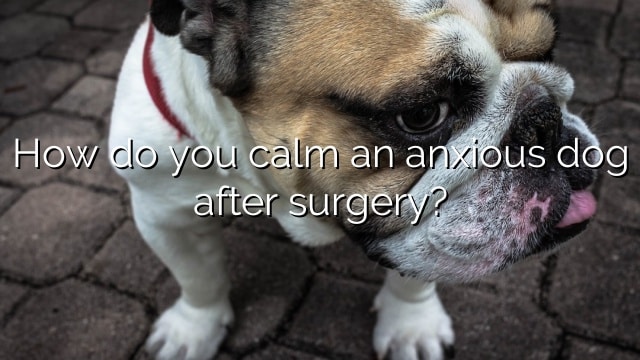There are a few things you can do to calm an anxious dog after surgery. One is to keep them comfortable and quiet by providing a warm bed, soft toys, and plenty of treats. Another is to distract them with games or activities that they enjoy. Lastly, make sure they have someone they trust to keep an eye on them during the recovery process.
Do dogs get scared after surgery?
Yes, dogs can get scared after surgery. This is because they may not be used to the new environment and may feel anxious. Some dogs may also have pain or discomfort after surgery. If your dog is showing signs of being scared or uncomfortable, please take him to the veterinarian as soon as possible.
Why does my dog have anxiety all of a sudden?
There are a few potential reasons why your dog may be experiencing anxiety. One possibility is that there may have been a change in their environment, such as a new person or pet in the home. Another possibility is that your dog may be reacting to a sudden change in their routine, such as when you leave for work and they’re suddenly left alone. Finally, anxiety can also be caused by certain medical conditions, such as thyroid problems or seizure disorders.
What is causing my dog’s anxiety?
There are a few things that could be causing your dog’s anxiety. One possibility is that your dog is experiencing separation anxiety. This is when a dog becomes stressed or frightened when they are separated from their owner. Other possible causes of anxiety in dogs can include fear of new people, new environments, or loud noises. If you’re not sure what’s causing your dog’s anxiety, it might be a good idea to consult with a veterinarian.
What does anxiety in dogs look like?
Dogs with anxiety may be restless, bark excessively, or drool excessively. They may also pace or restlessly move around. Some dogs may become aggressive or try to escape.
What can you do for dog anxiety?
There are a few things that you can do to help ease your dog’s anxiety. First, make sure that they have plenty of toys and playtime to keep them occupied. Secondly, try to create a safe and comfortable environment for them. This means keeping their environment clean and free of distractions. Finally, make sure that you understand your dog’s anxiety and how to help them cope with it.
Is it normal for dog to shake after surgery?
Yes, it is normal for a dog to shake after surgery. Shaking helps the dog to rid itself of any excess fluid, and reduces the risk of infection.
How can I make my dog feel better after surgery?
There are a few things you can do to make your dog feel better after surgery. Try to keep them comfortable by providing them with plenty of water, food, and love. Also, make sure they have plenty of toys to play with so they don’t get bored. Finally, make sure they are allowed outside as soon as they are able.
Is it normal for a dog to sleep all day after surgery?
It’s not uncommon for dogs to sleep all day after surgery. Depending on the surgery, some dogs may need a light sedation or anesthesia to minimize pain and discomfort. Sleeping through the night is also common following surgery.
What dog breeds are prone to anxiety?
Some breeds of dogs are more prone to anxiety than others. Some of the most common breeds that are prone to anxiety include: German Shepherds, Golden Retrievers, Labrador Retrievers, and Boxers. While any dog can be prone to anxiety, some breeds are more likely to suffer from it than others.
How do you know if your dog is having an anxiety attack?
There is no definitive answer to this question, as anxiety attacks can vary greatly in severity. However, some signs that your dog may be experiencing an anxiety attack include panting, whining, trembling, and having a hard time breathing. If you notice any of these signs in your dog, it is important to take them to see a veterinarian as soon as possible to rule out any underlying health problems.
How do you tell if your dog is stressed?
There is no one definitive answer to this question. Some indicators that your dog may be stressed include: increased panting, drooling, decreased appetite, restlessness, and barking more frequently. If you notice any of these signs in your dog, it may be a good idea to take him to see a veterinarian for a check-up.
Can I give my dog Benadryl for anxiety?
There is not a lot of research on the effects of giving dogs Benadryl for anxiety, but it is generally considered safe to do so. However, it is always best to speak with a vet before administering medication to a pet.
How do you calm an anxious dog on walks?
There are a few things that you can do to calm an anxious dog on walks. One is to try and keep your dog’s environment as calm and relaxed as possible. This means keeping the surroundings clean, free of distractions, and providing plenty of positive reinforcement. You can also try using treats or toys to keep your dog’s attention focused on you, and use verbal commands to remind your dog that you are in control.
How can I calm my dog’s anxiety naturally?
Dogs can be anxious for many reasons, including being left alone, new people or animals in the home, loud noises, and changes in routine. There are many things you can do to help your dog feel more comfortable, including providing plenty of toys and treats, establishing a regular schedule, and training your dog using positive reinforcement.
